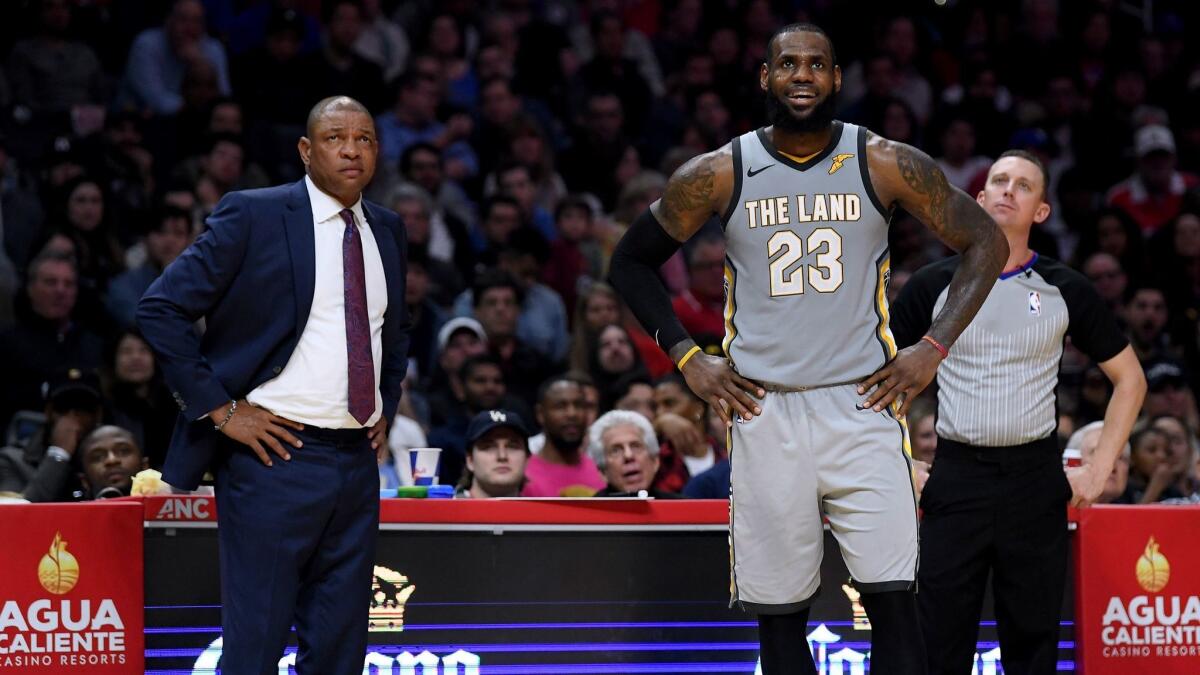LeBron James doesn’t need to be in L.A. to enhance his brand, but it couldn’t hurt
- Share via
One night, a 19-year-old Shaquille O’Neal found himself at a legendary nightclub amid the biggest stars he’d ever seen. It was a party hosted by Magic Johnson. There was Eddie Murphy here. Tom Cruise over there. When Johnson and Arsenio Hall arrived, the sea of people on the dance floor at the Roxbury on Sunset parted to honor their arrival.
That’s respect, he told himself. Respect for Johnson because Johnson brought championships to Los Angeles.
“When he walked into those places it was like God walking in that building,” O’Neal said. “I was like, ‘I want that.’”
To get that, O’Neal needed two elements. He needed to be in Los Angeles. And he needed to win championships. Simply one or the other wouldn’t do.
“I’d rather have L.A. respect than damn Minnesota respect,” O’Neal said. “I didn’t want Milwaukee respect.”
O’Neal wanted respect on the biggest stage possible, and that’s why the Lakers called to him. But he became a Laker 22 years ago, winning his first championship 18 years ago. It was a time when travel was more difficult, and so was communication across the country. When a multimillion-dollar empire hadn’t yet been built by an athlete who has lived most of his life in Ohio.
On Sunday evening, the Lakers will host the Cleveland Cavaliers. It won’t be LeBron James’ first trip to Staples Center this year — not even his first visit in the last week t— but it will be his first trip there to face the Lakers, who hope to lure him in free agency this summer.
In the past, the Lakers have sold the power of being a star in Los Angeles to potential free agents. James, though, is already a star. James is already a player in the entertainment industry. And all indications are that when James makes his free agency decision this summer, that decision will be about basketball, not everything else.
But can Los Angeles still serve as a selling point? Can it still be a boon to his brand?
O’Neal thinks so.
“Any big-time player that’s not looking at LA,” he said, “you’re making a mistake.”
::
On small raised stage in an event space in Hollywood, James emerged from a holding area as an NBC executive introduced him as “reigning NBA champion, LeBron James.”
It was September 2016, just after he’d led the Cleveland Cavaliers to their first title. An episode of the game show “The Wall” had just aired for a small group of assembled reporters. James wasn’t there to talk basketball, but “NBA champion” was a title that transcended his audience. He sat beside childhood friend and business associate Maverick Carter, also a co-founder of their production company SpringHill Entertainment.
“The show is about regular people who have an opportunity to change their lives in one second,” James said. “I think that’s so incredible. I’m a kid from a small town in Ohio that I wish we had an opportunity like that.”
But in that environment, nothing about James screamed “kid from a small town in Ohio.”
He fit seamlessly with the television-industry veterans; it was a setting as natural to him as basketball. James discussed his role in the movie “Trainwreck” with Amy Schumer the previous summer, and what he enjoyed about being behind the scenes as opposed to in front of a camera. He told a playful story about his wife’s emotions while watching screeners of “The Wall.”
“If we got pitches like this all of the time, I might be living in Malibu,” said James, who has homes in Bath Township, Ohio, and Brentwood.
That scene showed one thing clearly: James didn’t need to play basketball in Los Angeles to make a mark in the entertainment world. Proximity might only make things marginally easier.
Proximity is why the entertainment industry has long been tied to the Lakers, from famous courtside fans like Jack Nicholson, Denzel Washington and Dyan Cannon, to players making cameos or having featured roles in films.
“I didn’t necessarily feel like I was connected with the entertainment industry, but I had access to the entertainment industry,” said Derek Fisher, who won five championships with the Lakers.
Fisher appeared on “Dancing with the Stars” after his career ended. Former Laker Rick Fox went on to appear in various roles in more than a dozen television series over the past 20 years. Last weekend Kobe Bryant won an Oscar for best animated short, for which he worked with animator Glen Keane and Oscar-winning composer John Williams.
O’Neal, who began his NBA career in Orlando, started his movie career before he became a Laker, but he doesn’t think his connection to the entertainment world would have grown like it did without the championships he won for the Lakers.
“If I wouldn’t have won, I’m sure Denzel would have known who I was, but he wouldn’t be that nice,” O’Neal said.
To O’Neal, who is an analyst for TNT, the access to the entertainment industry was just a side benefit. To him, being in Los Angeles just means a better quality of life.
“Weather. Nightlife. People,” O’Neal said about what draws players to Los Angeles. “A lot of people say, ‘Guys, because of social media, you don’t need to play in a big market. ’ It’s not about basketball. It’s about after basketball. I’m in L.A. I’m on Sunset. I’m at the beach. I’d rather be at the beach than cold Minnesota.”
Fisher sees Los Angeles as a good fit for socially aware athletes like James.
“I think diversity and inclusion in those places is just as important to LeBron as anything,” Fisher said. “His kids can go to schools where there are kids of all colors and races on a regular, daily basis.
“It’s not just about L.A. being a cool city or nightclubs or restaurants. I just think guys are thinking bigger than that now.”
Given the power James’ brand already wields, though, to increase its influence would require a very narrow parameter.

“Obviously a championship is what the expectations are in L.A.,” said George Belch, a professor of marketing at San Diego State. “I still think there is upside for him in that L.A. market… I think in the NBA, the bar’s been set so high it’s all about winning championships. Going deep in the playoffs may not be enough to enhance his brand value even further.”
That’s indirectly why basketball will be at the forefront of his decision this summer. James will be where he can win a championship.
::
James gets it.
“It’s not my first rodeo, but it doesn’t bother me,” James said. “I don’t talk about it too much. I’ll handle that whenever it comes. I understand the conversation happens here because first of all they have cap space. This league is much better when the Lakers, the Knicks and the Celtics are all good at the same time. That’s what also creates the frenzy.”
He spoke after the Cavaliers had a shoot-around Friday, before playing the Clippers. Their shoot-around happened at UCLA, not far from where a Lakers fan had purchased one of four billboards designed to recruit James to the Lakers.
James said they were flattering. It’s a small taste of the city’s thirst for another championship.
O’Neal felt that after he won his first title with the Lakers.
He walked into Spago, Wolfgang Puck’s flagship restaurant in Beverly Hills. He had a meal. Then he tried to pay for that meal.
“I just remember after winning the first championship going to any restaurant in L.A. and guys saying, ‘Your money’s no good here, brother,’” O’Neal said. “‘We have a tradition of winning … Your money’s no good here.’”
Movies aside, that was when O’Neal knew he’d earned the L.A. respect he craved at 19.
Follow Tania Ganguli on Twitter @taniaganguli
More to Read
Go beyond the scoreboard
Get the latest on L.A.'s teams in the daily Sports Report newsletter.
You may occasionally receive promotional content from the Los Angeles Times.











